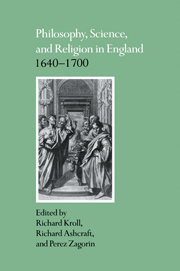Book contents
- Frontmatter
- Contents
- Notes on contributors
- Preface
- 1 Introduction
- Part I The Cambridge Platonists: philosophy at mid century
- 2 Henry More, the Kabbalah, and the Quakers
- 3 Edward Stillingfleet, Henry More, and the decline of Moses Atticus: a note on seventeenth-century Anglican apologetics
- 4 Latitudinarians, neoplatonists, and the ancient wisdom
- 5 Cudworth, More and the mechanical analogy
- 6 Cudworth and Hobbes on Is and Ought
- Part II The Restoration settlement
- Index
3 - Edward Stillingfleet, Henry More, and the decline of Moses Atticus: a note on seventeenth-century Anglican apologetics
Published online by Cambridge University Press: 05 November 2011
- Frontmatter
- Contents
- Notes on contributors
- Preface
- 1 Introduction
- Part I The Cambridge Platonists: philosophy at mid century
- 2 Henry More, the Kabbalah, and the Quakers
- 3 Edward Stillingfleet, Henry More, and the decline of Moses Atticus: a note on seventeenth-century Anglican apologetics
- 4 Latitudinarians, neoplatonists, and the ancient wisdom
- 5 Cudworth, More and the mechanical analogy
- 6 Cudworth and Hobbes on Is and Ought
- Part II The Restoration settlement
- Index
Summary
The theological legacy of the Cambridge Platonists to the liberal Anglicanism of the second half of the seventeenth century was acknowledged by their later contemporaries. Gilbert Burnet recognized them as the fathers of the broad church movement nicknamed latitudinarianism. John Ray draws on Henry More and Ralph Cudworth in his masterpiece of natural theology, The Wisdom of God in the Works of Creation (1691). Like their liberal-minded successors, the Cambridge Platonists sought to defend the faith by rational argument. While they were fairly eclectic in their philosophical sources, and receptive to contemporary philosophical and scientific developments, the Cambridge Platonists show a marked preference for neoplatonism as the philosophical under-pinning of religion. A specifically platonic element in their legacy can be observed among their latitudinarian followers, especially Simon Patrick. Indeed, the importance of platonism as the ancilla theologiae christianae is insisted upon by Simon Patrick in his A Brief Account of the New Sect of Latitude men, where he claims that “True Philosophy can never hurt sound Divinity” and makes an appeal for Christianity to be allowed to “choose her Servants where she best likes; let her old loving Nurse the Platonick Philosophie be admitted again into her family.” The other defender of the latitude men, Edward Fowler, insists in his The Principles and Practices of Certain Moderate Divines of the Church of England that most of the “Basic Tenets of Christian Religion” are found in pagan writings, “especially in the writings of the Platonists.” Fowler also quotes Henry More in this work. Nonetheless this admiration for neoplatonism is modified in later Anglican apologetics and absent from some, notably the Boyle lectures.
- Type
- Chapter
- Information
- Philosophy, Science, and Religion in England 1640–1700 , pp. 68 - 84Publisher: Cambridge University PressPrint publication year: 1992
- 3
- Cited by



